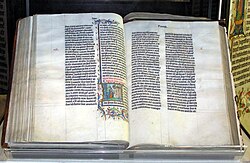
Back Ou Testament Afrikaans Altes Testament ALS ብሉይ ኪዳን Amharic Antigo Testamento AN العهد القديم Arabic ܕܝܬܝܩܝ ܥܬܝܩܬܐ ARC العهد القديم ARZ Vieyu Testamentu AST Басрияб КъотӀи AV Əhdi-ətiq Azerbaijani
| Old Testament Part of the Bible | |
|---|---|
| Information | |
| Religion | Judaism, Christianity |
| Language | Hebrew, Aramaic |
| Books | 39 (Protestant), 46 (Catholic), up to 49 (Orthodox) |
| Chapters | 929 |
| Verses | 23,145 |
| Part of a series on the |
| Bible |
|---|
 |
|
Outline of Bible-related topics |
| Part of a series on |
| Christianity |
|---|
 |
The Old Testament (OT) is the first division of the Christian biblical canon, which is based primarily upon the 24 books of the Hebrew Bible, or Tanakh, a collection of ancient religious Hebrew and occasionally Aramaic writings by the Israelites.[1] The second division of Christian Bibles is the New Testament, written in Koine Greek.
The Old Testament consists of many distinct books by various authors produced over a period of centuries.[2] Christians traditionally divide the Old Testament into four sections:[3] the first five books or Pentateuch (which corresponds to the Jewish Torah); the history books telling the history of the Israelites, from their conquest of Canaan to their defeat and exile in Babylon; the poetic and wisdom literature, which explore themes of human experience, morality, and divine justice; and the books of the biblical prophets, warning of the consequences of turning away from God.
The Old Testament canon differs among Christian denominations. The Eastern Orthodox and Oriental Orthodox Churches include up to 49 books, the Catholic canon contains 46, and the Protestant Bible typically has 39.[4] Most of these books are shared across all Christian canons, corresponding to the 24 books of the Tanakh but with differences in order and text. Some books found in Christian Bibles, but not in the Hebrew canon, are called deuterocanonical books, mostly originating from the Septuagint, an ancient Greek translation of the Hebrew Bible. Catholic and Orthodox churches include these, while most Protestant Bibles exclude them, though some Anglican and Lutheran versions place them in a separate section called Apocrypha.
While early histories of Israel were largely based on biblical accounts, their reliability has been increasingly questioned over time. Key debates have focused on the historicity of the Patriarchs, the Exodus, the Israelite conquest, and the United Monarchy, with archaeological evidence often challenging these narratives. Mainstream scholarship has balanced skepticism with evidence, recognizing that some biblical traditions align with archaeological findings, particularly from the 9th century BC onward.[5]
- ^ Jones 2000, p. 215.
- ^ Lim, Timothy H. (2005). The Dead Sea Scrolls: A Very Short Introduction. Oxford: Oxford University Press. p. 41.
- ^ "Bible 101: A Brief Introduction to the Old Testament". Simply Catholic. 13 July 2024. Retrieved 11 February 2025.
- ^ Barton 2001, p. 3.
- ^ Faust, Avraham (2022). "Between the Biblical Story and History: Writing an Archaeological History of Ancient Israel". In Keimer, Kyle H.; Pierce, George A. (eds.). The Ancient Israelite World. Taylor & Francis. p. 78-79. ISBN 978-1-000-77324-8.
© MMXXIII Rich X Search. We shall prevail. All rights reserved. Rich X Search